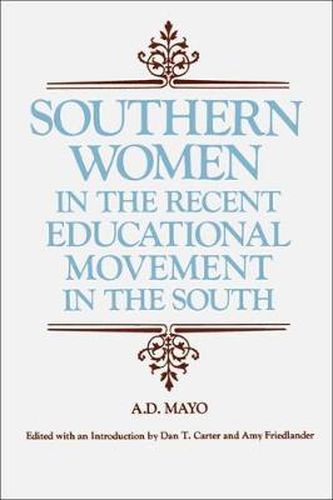Readings Newsletter
Become a Readings Member to make your shopping experience even easier.
Sign in or sign up for free!
You’re not far away from qualifying for FREE standard shipping within Australia
You’ve qualified for FREE standard shipping within Australia
The cart is loading…






This title is printed to order. This book may have been self-published. If so, we cannot guarantee the quality of the content. In the main most books will have gone through the editing process however some may not. We therefore suggest that you be aware of this before ordering this book. If in doubt check either the author or publisher’s details as we are unable to accept any returns unless they are faulty. Please contact us if you have any questions.
Like many other northern clergymen after the Civil War, A. D. Mayo became interested in the role that education could play in rebuilding southern society. From 1880 to 1900 he traveled from Virgina to Texas as an educational missionary advocating the
new education
theories of the 1840s and 1850s. In time he came to be considered one of the most perceptive observers of southern education during the period from the end of Reconstruction to the rise of the Redeemer governments in the 1890s.
Mayo was convinced that the changes in southern society that Reconstruction had failed to bring about could be realized under a sound educational system. Learning, he believed, should be based on individual needs rather than on rote memorization of facts, and teachers should be recruited from those trained in the civilizing values. In Southern Women, Mayo set forth at length the ideas that southern white women were the ideal ones to transmit learning to the young blacks. Stressing the greatly expanding role of these women because of the war, Mayo saw them as a kind of elite trained in the ideals and culture of the Old South, but receptive to the values of the New South.
In their introduction Dan Carter and Amy Friedlander place Mayo in the context of nineteenth-century intellectual and social currents and provide an interesting perspective on his often surprisingly contemporary-sounding ideas on education.
$9.00 standard shipping within Australia
FREE standard shipping within Australia for orders over $100.00
Express & International shipping calculated at checkout
This title is printed to order. This book may have been self-published. If so, we cannot guarantee the quality of the content. In the main most books will have gone through the editing process however some may not. We therefore suggest that you be aware of this before ordering this book. If in doubt check either the author or publisher’s details as we are unable to accept any returns unless they are faulty. Please contact us if you have any questions.
Like many other northern clergymen after the Civil War, A. D. Mayo became interested in the role that education could play in rebuilding southern society. From 1880 to 1900 he traveled from Virgina to Texas as an educational missionary advocating the
new education
theories of the 1840s and 1850s. In time he came to be considered one of the most perceptive observers of southern education during the period from the end of Reconstruction to the rise of the Redeemer governments in the 1890s.
Mayo was convinced that the changes in southern society that Reconstruction had failed to bring about could be realized under a sound educational system. Learning, he believed, should be based on individual needs rather than on rote memorization of facts, and teachers should be recruited from those trained in the civilizing values. In Southern Women, Mayo set forth at length the ideas that southern white women were the ideal ones to transmit learning to the young blacks. Stressing the greatly expanding role of these women because of the war, Mayo saw them as a kind of elite trained in the ideals and culture of the Old South, but receptive to the values of the New South.
In their introduction Dan Carter and Amy Friedlander place Mayo in the context of nineteenth-century intellectual and social currents and provide an interesting perspective on his often surprisingly contemporary-sounding ideas on education.